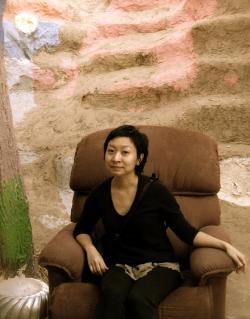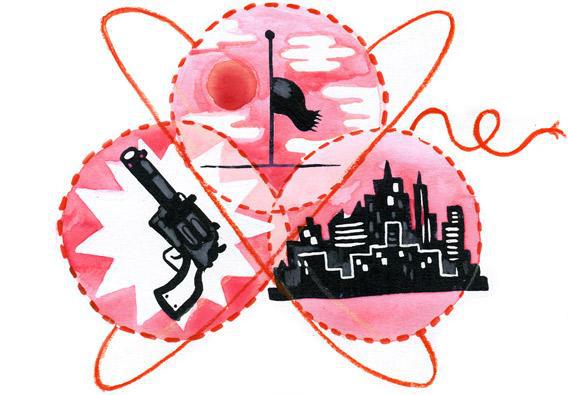For such a tiny community, contemporary poetry is remarkably committed to creating sub-cultures: new formalism, elliptical poetry, conceptual poetry, flarf—even cowboy poetry claims a surprisingly large seat at the table. Here are two more: American poetry increasingly falls on one side or the other of the divide magnified by our time of access and anxiety, the reach and confusion of our accelerating age. Some poems try to slow down, seeking an alternative in contemplation. Others attempt to embody our appetite, disruption, and scale.
Cathy Park Hong’s new collection, Engine Empire, falls squarely in the latter camp. A third of the book is set in the American West in the years of the Civil War, a third in a contemporary Chinese mega-city, and a third in a near-future where the Internet, in the form of “smart snow,” is being fully incorporated into people’s minds. (It’s a work in progress: “You look at the toaster and think taco./An ad pops up in the air for a trip to Cabo San Lucas./The snow is still beta.”) All three have in common an unreality made up of our cultural baggage; Hong is unabashed in appropriating wide swaths of human culture, including the cultures of the future.
In Engine Empire, Hong is interested in boomtowns and frontiers, and that interest manifests itself both in a great skepticism about our ambition and an unbelievably ambitious approach to the stories she tells, which is, I think, part of the point. She isn’t looking to capture the past, present, and future so much as she’s taking her turn at restitching the crazy quilt of associations that make up our hyper-informed view of everything around us. Part of what makes that worthwhile is Hong’s ability to turn her language into more than pastiche, developing styles of writing that feel dense with the historical richness of the English language—a history of borrowing, invention, and manipulation that Hong honors, in part, by making room for her own inventiveness. This is especially true in the first section, where the bent idiom of our imagined Wild West anchors her mythy serenades. She composes three poems around a single vowel-sound each, and the results are sometimes dazzling, as in the last stanza of “Ballad in A”:
At dawn, marshal stalks that ranch,
packs a gat and blasts Kansan’s ass
and Kansan gasps, blasts back.
A flag flaps half-staff.
Though Hong’s message, inasmuch as she can be pinned down to one, involves the moral peril of crossing frontiers, she never gives in to easy answers, instead insisting on the way in which we need something to push forward or past. In fact, the most poignant moments in “The Word Cloud,” Engine Empire’s sci-fi third section, have to do with aimlessness and joblessness. One poem ends in a park where a woman goes just to get out of the apartment, though in the connected future she can never quite get away:
Underneath the sound of children laughing, you hear users chatting
over each other, which all blurs into a warring shadow of insects
and the one that sounds like a hornet is your husband,
telling you to put his stuff in storage.
Or sell it to pay off bills or
leave, why don’t you goddamn leave.
You sit on the bench until the sky turns pink.
When your former employer let you go,
they said, you are now free to pursue what you want to pursue.
So here you are.

Photograph by Thomas Sayers Ellis
And yet: If Hong is pessimistic about humanity, she strikes me as a remarkably happy pessimist, one who finds the absurdity of people and culture endlessly fascinating, which leads to a persistent sense that the value of the book may not line up with its values.
Partly, this is a risk of writing in a way that embraces our culture of overlap, but it’s also the outgrowth of a skepticism that ultimately seems to extend even to herself and her audience. Hong ends Engine Empire with a move that’s both brilliant and frustrating, a variation on the “it was all a dream” ending that feels deeply unsatisfying even as it perfectly encapsulates the way pop culture won’t ever stop shaping our perceptions. For some readers, that dissatisfaction may feel like an honest and necessary conclusion. But others may feel that kind of dissatisfaction needs no reiteration, and there’s just as much honesty in looking for ways to sustain ourselves.
The good news, though, is that Engine Empire is also a sustaining book, one that believes in the value of being moved by words—the value, that is, of being human. It’s frequently giddy with humor and invention, and sometimes, though less often, neck-deep in sympathy and dismay, singing of
men unspared, praying to be unstitched
from earth, crying: let us free to roam,
wade into shadow so the flayed
red threads of our soul can cool to will
and we can spread our spores,
and if we fail, He will smite us.
—
Engine Empire by Cathy Park Hong. Norton.
See all the pieces in this month’s Slate Book Review.
Sign up for the Slate Book Review monthly newsletter.
